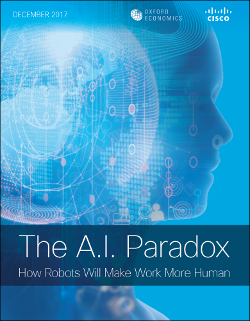Ungated Post | 26 Feb 2018
The AI Paradox – How robots are making work more human

Over the next decade, a great wave of technological change will wash through the economy, transforming the nature of work and the shape of the labour market. We collaborated with Cisco to study the implications of these trends on jobs over the next decade. Our results are based on a brand-new, multi-layered modelling framework, that enables us to simulate the real-world dynamics of technological change and its interaction with the world of work.
We found that 6.5 million US workers will have to seek out a new profession over the next decade. Workers in transport, lower-level manufacturing and agriculture jobs will face a difficult time. Meanwhile, we see new jobs emerging in other areas, such as computing, management and media, as well as in healthcare and sales.
The Oxford Economics Skills Matching Model is used to help us simulate the job-moves workers will make in response to a shift in the nature of work. What emerges are signs the US is facing a significant reskilling challenge. There are acute ICT skills shortfall to overcome and, paradoxically, as technology becomes more capable it is "human skills" that explain much of the gap between today’s workforce and the needs of the future.
Oxford Economics’ team is expert at applying advanced economic tools that provide valuable insights into today’s most pressing business, financial, and policy issues.
To find out more about our capabilities, contact:
Americas
Diantha Redd
+1 (646) 503 3052
Email
Asia Pacific
Peter Suomi
+65 6850 0110
Email
EMEA
Aoife Pearson
+44 (0)203 910 8054
Email
Related Services

Post
The Economic Footprint of JLR in the UK
This report examines the economic footprint of JLR in the United Kingdom in 2024. The analysis is conducted both at the national level, as well as on the West Midlands and North West regions, where JLR’s main facilities are located.
Find Out More
Post
Airbnb’s Economic Contribution to APAC in 2024: GDP, Jobs, and Regional Impact
Airbnb's platform connects hosts across Asia Pacific (APAC) with travellers from around the world. Oxford Economics was commissioned by Airbnb to quantify its economic footprint in 10 APAC markets in 2024.
Find Out More
Post
Economic Insights: Airbnb’s Contribution Through the Lens of Oxford Economics
Oxford Economics Australia delivered a tailored economic impact assessment for Airbnb, including GDP contribution modelling, job creation analytics, guest‑spend segmentation, and regional tourism dispersion insights to underpin Airbnb’s stakeholder communications and strategic growth initiatives.
Find Out More